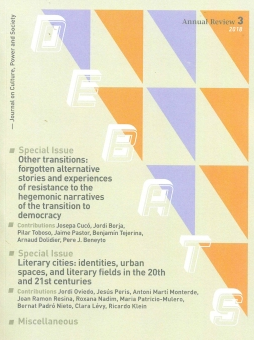The revolutionary left and the transition: dynamics and processes
Abstract
The aim of this article is to present, in rough outlines, the relationship between the Spanish revolutionary left and the transition process in Spain, and their mutual impact on each other. Moreover, we also address, in a synthetic way, the stages of formation, boom, and decline in the various radical forces. These clusters shared ideologies, expectations, and political cultures, as well as approaches, proposals, and forms of operation, with their homonymous European counterparts. They shared a common background upon which the dictatorship and experience in the Spanish context also left a mark, and this strongly determined the forms of action and the organisational structure of several groups which considered the anti-Francoist fight a synonym for the revolutionary fight. Their evolutionary cycle was, as a whole, linked to the ups and downs of political change during the Franco regime, and in its crisis they represented a crucial motor for social agitation and mobilisation. The rise of democracy in Spain is still developing, albeit in parallel to the decline of these collectives. After successive electoral failures and their conversion into the extra-parliamentary left, these various groups have gone into a rapid process of descent in which widespread weakening, fusions, sectarianism, and dissolution are combined in all their possible forms.Downloads
Downloads
Published
How to Cite
Issue
Section
License
Without prejudice to the provisions of article 52 of Spanish Law 22/1987 of November 11 on Intellectual Property, BOE (official state bulletin) of November 17, 1987, and pursuant to said legislation, the author(s) surrender(s) free of charge its rights of edition, publication, distribution and sale of the article, for its publication in Debats. Journal on Culture, Power and Society.
Debats. Journal on Culture, Power and Society is published under the Creative Commons license system in accordance with the «Recognition - Non-Commercial (by-nc) modality: The generation of derivative works is permitted provided that commercial use is not made. Nor can the original work be used for commercial purposes».
Thus, when the author submits his/her contribution, he/she explicitly accepts this assignment of publishing and publishing rights. Authors also authorize Debats. Journal on Culture, Power and Society to include their work in an issue of the journal to be distributed and sold.











